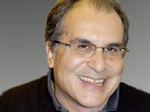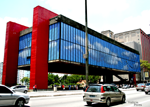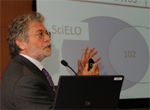The editor of the WHO Bulletin talks about the various trends permeating international Open Access scholarly communication, the Finch report (UK), megajournals, multilingualism, and the transformative impact of technologies that always bring out conditions that favor or challenge the development of journals of developing countries or emerging economies, in particular those of SciELO. … Read More →
Paper proposes four pillars for scholarly communication to favor the speed and the quality of science
The authors identify four converging cornerstones for advancing the process of communicating academic research: enhancing products and formats of scholarly communication; immediate publication in Open Access; open peer review; and broad public recognition of the process of communication, of the corresponding products and of the academics involved. … Read More →
Celebrating the enhancement of the quality, visibility and accessibility of South African scholarly journals
The Academy of Science of South Africa (ASSAf) held a series of events in July at the launch of the Certified SciELO South Africa collection on national programs that support the development of journals. Susan Veldsman, Director of the Scholarly Publishing Unit of SciELO South Africa discusses these events. … Read More →
Open Access and a call to prevent the looming crisis in science
The number of retracted articles has recently been on the rise. Björn Brembs identifies this tendency as a reflection of an imminent crisis in science whose origin is found in the reward and marketing system of researchers which pressures them to publish in high impact journals. The adoption of open access platforms is a way to prevent this crisis. … Read More →
Paulista Avenue, more than 120 years … the avenue at the heart of São Paulo
The participants at the SciELO 15 Years Conference will have the chance to visit and stroll along the broad sidewalks of Paulista Avenue (Avenida Paulista) with the thousands of others who come to this street every day. The conference venue is just one block away from Paulista Avenue. This avenue is the financial and cultural center of the city and is a popular place for celebrations, events and other gatherings. … Read More →
SciELO – the first 15 years: towards a New Era
The SciELO in Perspective blog makes its debut with the aim of promoting the exchange of information, experiences and knowledge in scholarly communication. The intention is to share the advances of the SciELO Program and Network in their new development phase. Your collaboration is welcomed. … Read More →
Declaration recommends eliminate the use of Impact factor for research evaluation
The use of the Impact Factor (IF) beyond the scope of journal ranking as a direct or indirect proxy for the evaluation of research quality, career promotions, granting of funds, ranking of graduate programs, etc. has been questioned for quite some time. The San Francisco Declaration on Research Assessment makes a new and critical call against the use of the IF in the evaluation of research. … Read More →
Interview with Abel Packer
SciELO developed as an integral part of the research infrastructure of the countries where it operates, focusing on the goal of contributing to the improvement of the journals it indexes and publishes in open access. Abel Packer, Coordinator of the SciELO Program, talks of the reasons for the success of the program, the expectations of the SciELO 15 Years Conference and the future sustainability of the program. … Read More →
Interview with Rogerio Meneghini
According to Rogério Meneghini, the SciELO Scientific Coordinator, SciELO’s objective of increasing the international impact of Brazilian journals is not incompatible with the publication of leading edge research in high impact journals. But in order for SciELO journals to meet international standards, SciELO will have to become a publisher itself so that it can have some influence on the development of the journal evaluation process. … Read More →
Apart of SciELO, FAPESP promotes new initiatives in open access
The Scientific Director of the São Paulo Research Foundation (FAPESP), Carlos Henrique Brito Cruz, highlights the advances of the SciELO Program and announces the creation of institutional repositories at the University of the State of São Paulo to hold open access articles from research funded by FAPESP. He also announces a call for proposals in coordination with other Brazilian funding agencies to professionalize selected national journals. … Read More →
São Paulo city
The city of São Paulo will be the setting for the SciELO 15 years Conference. It is a city that always amazes first time visitors, as well as those who return and continue to discover the many nuances it has to offer. The SciELO 15 Years Conference will be located in the central part of the city, which will definitely make it convenient for the participants to learn more about this cosmopolitan economic, scientific and cultural center. … Read More →























Recent Comments